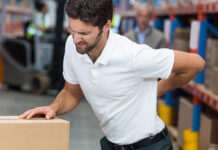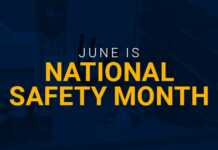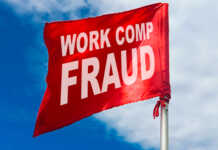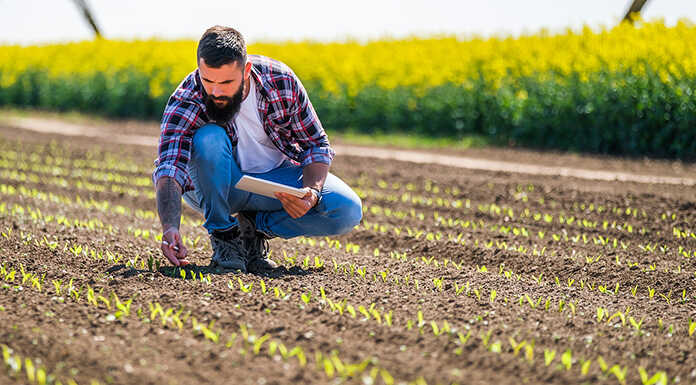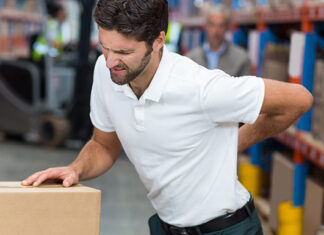I do not want to jinx myself, but I’m very proud of the fact that with over 25 years as a Risk Management Consultant, I have yet to take a fall in an agricultural field, or even worse, in front of people. Fifteen years ago, I got a Jeep 4 X 4 stuck in the mud, and I am still occasionally reminded of that lapse in judgment even by total strangers: “Oh, you’re the guy who buried his Jeep in the mud up to the axles! LOL!.”
I know that if I use care, take my time, am conscious of where I step, and use the appropriate footwear, slips, trips, and falls are 100 percent preventable. In an agriculture setting, slips, trips and falls are a particular risk because of the varying types of commodities being harvested, the unevenness of walk surfaces (rough terrain), and the fact that plants need to be constantly irrigated, making walk surfaces slippery. Walk surfaces are often wet, muddy, water-saturated, and icy in some regions.
According to the U. S. Department of Labor, falls in agriculture are the industry’s second most common injury type. For example, according to the U. S. Bureau of Labor Statistics, in 2018 there were 5,000 slips, trips, and falls resulting in days away from work. These types of injuries pose a significant hazard for agricultural workers.
Do this to prevent a slip
Slips are characterized by falling backward when our feet slip from beneath us. Slips are typically caused by a lack of friction between the foot and walking surface. That’s why good footwear is key to preventing slips. It is recommended that a hard-toe shoe with slip-resistant treads be used for protection against nails, welding sparks, and work-around equipment. However, if you work in a wet environment, such as in irrigation or harvesting, a water and slip-resistant hi-cut rubber boot may be better suited. Each hazard must be identified, and the most appropriate footwear should be required to be used.
Common contributors to slips:
- Wet, muddy, uneven and rough terrain surfaces
- Poor housekeeping, such as spoiled product left in common walkways (also a food safety hazard)
- Uncontrolled water that is often over sprayed
- Unauthorized employees entering recently irrigated fields
- Poor weather conditions
Don’t trip!
Trips, on the other hand, are characterized by falling forward due to the foot or lower legs being caught onto an obstacle while the upper body continues in a forward motion. Missing a step or even jumping off equipment such as tractors and forklifts is common. One of the primary reasons safety professionals always emphasize the three points of contact rule (two hands, one foot) when entering and exiting tractors, forklifts, and trucks is trips and falls that occur from vehicles. Trips can be caused by poor housekeeping, such as harvest cartons, plastic ties and shrink wrap left lying around, and even untied shoe laces.
Fall contributors
Falls can be divided into falls from the same level or falls from heights. Slips and trips are often a common contributors to falls, as can be loss of balance, running, or failure to use fall prevention or arrest systems when working at heights.
Tips for preventing slips, trips and falls
Identifying and correcting hazards and employee training to heighten awareness are the keys to preventing slips, trips, and falls. Immediate repair of water leaks to irrigation systems and water tanks can prevent injuries. One of the key tasks of a crew boss or supervisor is to ensure the planting, cultivating, and harvest sites always maintain good housekeeping. This means removing unnecessary pallets, cartons, and production debris. Maintain clear walkways for employees and keep water lines, drip tape and plastic sheeting picked up.
Hold supervisors accountable for identifying slip and fall risks and for eliminating a risk (such as repairing a broken sprinkler head or picking up spilled product). Employees should be alerted of areas to avoid, and all work areas and designated walkways should be properly maintained.
It is crucial for unnecessary equipment and materials that are not immediately needed to be kept clear of the work area. During harvest periods, any spilled product must be cleaned up immediately to avoid creating slips and fall exposures.

Crew trainings are a must
Ensure that employees receive ongoing training on safe work practices, such as maintaining three points of contact at any height. A height can be, for example, a tractor or a six-foot ladder. If your commodity requires the use of ladders, daily documented ladder inspections should be the norm. Damaged ladders should be properly discarded. Employees should be taught safe ladder safety during onboarding and continue during ongoing tailgate safety meetings.
A key to safety for any industry is enforcing and recognizing safe work behaviors. Employees should be trained to wear slip-resistant shoes and to never jump between harvest rows. Employees should also be trained to avoid or slow down when working in sloped terrain.
Mitigating risk for piece rate employees
No running for employees under a piece rate plan where payment is a fixed amount for each unit produced. Teach employees to do the math. Remember, even a small amount of running carries more injury risk than walking. For example, if a grower is paying $2.10 per harvested carton, it is safer to walk fast rather than run. I once observed a worker who walked fast as compared to running in a row. The worker who walked fast was the number two worker on the crew. The number one worker on the crew produced fifty cartons a week more than the number two worker. However, imagine the increased risk of running as compared to walking fast.
It is a fact that when you run you place one foot in contact with the surface and the second foot is in motion at an increased rate of momentum. On the other hand, when an employee is walking, the strides are smaller, and both feet are in contact with the ground more frequently at a lower rate of momentum, reducing the risk of a fall. Thus, the possibility of a fall increases when running compared to walking.
One must ask, after taxes how much did the number one worker who was running really earn as compared the worker who walked fast. Let’s say they earned $75 extra on their weekly paycheck after taxes. Would suffering an injury be worth an additional $75 in a weekly paycheck? What did you do with the last $75 in your pocket? Was the risk worth getting seriously injured and putting at risk your ability to provide for your family?
It all comes down to education and recognition of risk and taking personal responsibility, by both the employee and the employer, for reducing risks to our coworkers and ourselves. Running, rushing and risk-taking behavior can be avoided by training employees to be cognizant of the risks of slips, trips, and falls when working on the farm.


